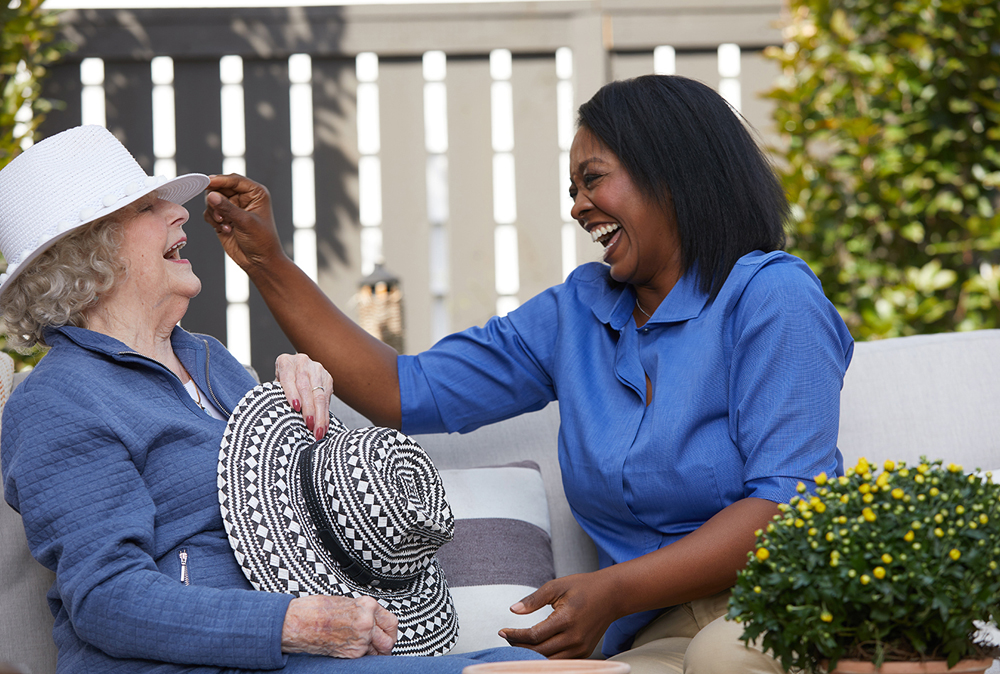CONTACT US
If you are a journalist and have a media enquiry please email media@prestige-nursing.co.uk or phone 020 8254 7500
This email address is not for the purpose of paid advertising opportunities or job applications.
How to become a personal care assistant
Are you interested in becoming a personal care assistant? Find out more about personal care and the current vacancies with Prestige Nursing & Care.
As the population gets increasingly older, the UK is set to see the demand for care workers rise. Care workers, including personal care assistants, play an instrumental role in meeting the needs of vulnerable people that require care and support.
Prestige Nursing & Care is a leading provider of home care services across the UK. By joining our closely-knit team, you’ll enjoy competitive pay rates, fantastic benefits and ongoing training and support.
Here is everything you need to know about becoming a personal care assistant and how you can join our award-winning team.…
A day in the life of a care worker
At Prestige Nursing & Care, our care workers have a range of different roles and responsibilities. Some of our care workers provide 24-hour care, whereas some will pop into a client’s house to prepare dinner or even just have a chat. It’s one of the great things about the job – every day is different!
However, here is what a ‘typical’ day could look like for one of our trained care workers who visit numerous clients on a daily basis….
Bed blocking crisis and elderly care shortage cost NHS millions.
Over the past five years, local councils have seen their budgets slashed with a huge impact on the amount of elderly care they can provide. Research carried out by the Association of Directors of Adult Social Services (Adass) and reported in The Telegraph shows that councils have lost 31% of their care budgets in just five years.
A lack of available services from local councils has forced many people to turn to the NHS for help. In doing so, it has contributed significantly to the already prominent bed-blocking crisis and cost the NHS almost £670million on patients who – with care support available – could otherwise be discharged, according to research by Age UK.
The Age UK study estimated that patients spend a combined 399,000 days in hospital in the last year while waiting for suitable care to become available. This costs taxpayers an average of £1,925 per week, while the average cost of residential care or home care is £558 and £357 per week respectively. A coherent approach to resolving the bed-blocking crisis is needed, with the NHS working with social care providers to support elderly patients’ needs. Caroline Abrahams, Director of the Age UK, illustrates this perfectly when she asks: “Why to waste precious NHS resources in this way when it would be so much better to fund social care properly instead?”
Aside from the financial implications, previous Prestige Nursing + Care blogs have examined the damaging impact that bed blocking and staying in a hospital can have on individuals, leaving them feeling isolated in unfamiliar surroundings. Instead, home care can provide personal support in their own home which helps the elderly to maintain some independence, while in turn reducing the burden and the cost on the NHS.
These issues will not be resolved by themselves when there are new cuts planned across services by the Conservative government which will further limit elderly care. It remains of paramount importance that care funding is not neglected and that government and leaders in the care sector make better use of the available resources to resolve the issue of bed-blocking.
How to become a carer for the older generation
Caring for older people is a unique and rewarding field to work in, not least because it offers a sense of reward, doing something worthwhile and a personal achievement at the end of each day. Many staff will testify that building relationships with older clients to support and help them in everyday life is what makes home care jobs such a gratifying experience.
The duties and responsibilities of a care worker for the older generation are extensive and varied, which means no two days are ever the same. It is a wide-ranging role, as demonstrated by the range of services we provide at Prestige Nursing & Care, such as Companion Care or Personal Care and Support.
Our nurses and carers are the heroes of our business. We are always looking for experienced and compassionate individuals to join our exceptional team. If you want to make a positive difference in someone’s life, here you can learn more about working with Prestige Nursing & Care or search our available job vacancies.
What qualifications and training do I need to be a carer?
Becoming a carer doesn’t require too many formal qualifications. There are a variety of training options, including college courses, which are available to provide you with the skills needed for becoming a carer for the elderly. Taking college courses often opens the door to more opportunities to receive formal certifications in care work, such as a National Vocational Qualification (NVQ).
Of course, being a successful elderly carer requires more than just training and education. Being a quality carer involves having a genuine concern and desire to make a positive difference in someone else’s life. Among the most important care worker skills and qualities is having the ability to help elderly clients maintain their independence and dignity – sometimes in challenging conditions, in addition to maintaining a strong sense of compassion.
What skills do I need to become a carer?
As a carer, you will be looking after vulnerable people and empowering them to become as independent as possible. To provide such exceptional care, the best carers share certain skills and attributes, including:
- Great communication skills
- The ability to plan, organise and multi-task
- A sunny demeanour and a good sense of humour
- Strong problem-solving and time-management skills
- Highly observant
- Reliability
To become a carer with Prestige Nursing & Care, we also require the following qualifications and practical skills:
- A good standard of written and spoken English
- The right to work in the UK
- Clear police, occupational health and reference checks
- Good professional and personal references
- Six months’ professional care experience in a care or health setting, for example as a domiciliary carer, care assistant, homecare worker, support worker or healthcare assistant. However, if you are new to care we offer training leading to Care Certificates for certain roles, so please contact your nearest local branch to find out more
What experience do I need to become a carer?
There are various routes to becoming a carer. Although college qualifications are one option, it is also possible to learn on the job or to take an industry-based training programme.
People learn differently, and while classroom learning has benefits for any aspiring professional, many people thrive in a more hands-on environment. Learning on the job provides carers with a great understanding of their client’s needs and the role’s demands. Would-be carers must think about which option would suit them best before embarking on this career path.
At Prestige Nursing & Care, we ideally look for individuals with at least six months of professional care experience. We only have a limited number of live-in care vacancies for people with no professional care experience. But we’d love to talk to you if you’re interested in finding out how to get into live-in care for the first time.
Start a rewarding career with Prestige Nursing & Care
Carers are the heroes of our business. Everything we do is designed to support and empower our carers to provide exceptional care to our clients. This ‘carer first’ mentality is reflected in our flexible approach to working and in the industry-leading training we provide.
Our ‘Introduction to Care’ training programme will provide you with the education and tools needed to kick-start your career. It is a comprehensive training programme that provides the knowledge, self-assurance and skills needed to succeed in a carer role.
Part of the course includes shadowing a care worker for hands-on experience. This will provide you with confidence in your ability to handle the responsibility of working life as a professional carer. The course additionally provides would-be carers with the opportunity to work with a broad range of clients such as older people and people with disabilities or learning difficulties.
Other benefits you can expect from Prestige Nursing & Care include:
- Hourly rates are often higher than other agencies
- A flexible way to work locally – the hours you want, when you want them
- Working with a local team at a local branch
- A variety of work matched your skills and interests
- Ongoing training and development
- A Member Advantages programme offering retail discounts
Apply for a carer job with us
Ready to start a rewarding career with Prestige Nursing & Care?
Whatever your skills or experience, applying for a role is simple. You can learn more about our job requirements and our recruitment process in our carer jobs section.
Contact our friendly recruitment team or explore our current carer jobs to see what’s on offer at Prestige Nursing & Care.


